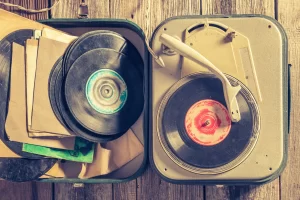Playing for an audience is one of the most exciting parts of being in a band. In fact, it may be one of the main reasons you started playing in the first place. However, knowing how to get music gigs can be a daunting task for beginners. Whether you’re flying solo or playing with a full house of musicians, setting up gigs can be one of the biggest hurdles a band will have to face.
When it comes to booking a gig, it’s always important to remember that promoters, bookers, and venues are constantly looking for fresh new acts. Of course, the biggest (and best) pieces of advice are to be patient and persistent. Getting booked can be challenging when you’re first starting out and even if you have a string of performances under your belt.
So, while it is true that “you only need one yes” to set off your musical career or hobby, it never hurts to have a few more tools in your tool box to help you land the gigs you want to be playing.
What is booking? And how does it work?
While you might already have a pretty good idea of what booking is, being able to grasp the concept beyond the surface will help give you a better understanding of what promoters are looking for and, if you’re having trouble getting gigs, help you troubleshoot.
Booking is when a musical act is scheduled to perform at a specific venue or event for an established period of time. Generally, acts are secured by booking agents or managers. Depending on the caliber of the venue, event, or clientele, the booking manager may reach out to a band in order to book them.
Once an event is booked, a promoter will then help to establish a booking deal and determine the promotional strategy they are going to use to promote the show. Generally, promoters work off a commission that’s based on ticket and bar sales. So, bands with a larger “poster value” or projected revenue will be prioritized over smaller ones.
Once you have convinced the promoter that your musical prowess will have people banging down the doors to get in, a booking contract will be sent out to solidify the details of the show. Contracts can include a list of requirements, stage technicalities, and provided food and drinks. For your first few gigs you’ll probably be playing for free, but eventually your contract will begin to include an invoice.
The invoice will detail the amount to be paid to the artists for performing (artist fee) and the amount to be added to the artist fee (booking fee). Generally, this will be paid before the start of the show.
Of course, this is just a general overview. If you’re looking to land your first gig, odds are that you probably won’t have to deal with too many contracts; but you will probably have to deal with a promoter and/or a booker.
8 tips for how to get music gigs
1. Practice, practice, practice
When it comes to landing gigs, you only have one shot to make a good impression. That’s why it’s essential to be well-prepared before you approach a booking manager. Whether you write your own songs or you’re going to play covers, make sure that you’ve refined your sound and style to be something captivating.
While you don’t need to have all 13 songs you’d want to play on a set show ready, it’s a good idea to pick three or four songs to rehearse to perfection before you meet with a booking manager.
2. Record
Although we’re past the age of demo tapes and CDs, it’s important to have a portfolio of music to show to booking managers and promoters. Take time to record three to four songs, even if they are just stylized covers, that will give booking managers a good idea of your musical prowess.
For your digital showcase, choose songs that highlight your strengths as a solo musician or band. This doesn’t have to mean that the first song on your demo is the most difficult or flashy song out there. What is most important is that you’re maintaining your signature sound across tracks and doing it in a way that’s interesting.
Post the recordings to SoundCloud, Spotify, or another music platform and be sure to include a link to your work in your initial promotor email. The easier you make it for people to interact with your work, the more likely they are to engage.
3. Build your brand
When a venue considers a band, promoters and booking managers will look at your social media, Spotify, and other accounts to try to determine how much potential profit your band will bring in.
If you haven’t played any gigs, it’s essential to have your social media marketing on point. In order to get gigs, you need to look and sound the part. Your brand should be the strongest point of your pitch because that is what’s going to get the promoter’s or booking manager’s attention.
4. Build a network
Fortune favors the bold, so be bold enough to ask who you know or who you want to know. Attend music networking events in your area or build your network organically by reaching out to local artists you admire.
Asking for a handout on your first meeting can be awkward, so engage in some informative interviewing. More often than not, people are happy to give advice and share their story. Go into your meeting with the intention to build a relationship rather than asking for their contact list.
5. Make a list of local venues and promoters
When you’re just starting out, keep your search local–you’re more likely to get opportunities to play at local bars, clubs, and open mics. These are essential to building your profile and will give you good exposure.
Make a list or spreadsheet of local venues and include the name and contact information of the booking agents. Be sure that, when considering a venue, you understand what type of music that venue generally houses, you don’t want to market yourself to a jazz club if you play mostly Metallica covers.
Once you’re ready, draft up a template email with a killer pitch that has a clear message, but is also friendly and relaxed.
6. Refine your pitch
When getting ready to pitch your band, be sure to do your research. Knowing who you’re connecting with can allow you to ask that person questions about their experience and help you build a deeper relationship.
A good rule of thumb to follow when pitching yourself is to keep your pitch short and sweet. Booking managers get tons of emails and pitches every day. You want the booking manager to walk away knowing exactly why your band is the best investment, not lost in a multi-paragraph email that details your entire band’s journey. A great pitch is one that provides enough information to leave people wanting more.
Be sure to include links to your website, Spotify, Soundcloud, or other platforms that you have music on as well as your social media and contact information. If you haven’t heard back in a week, it could be a good idea to send a follow up email to help you stay fresh in the mind of the person you’re contacting.
7. Seek out competition
When you’re doing your research, it’s also a great idea to seek out music competitions, meet-ups, and tournaments. Nonprofits and cultural hubs are a great way to find and connect with local musicians and get free exposure and padding for your profile. Some even offer cash prizes to winners, which is just an added bonus.
8. Look for supporting gigs
A great way to get your foot in the door is to look for support act openings. Attend your favorite shows and notice which of the bands you love is flying solo. Sometimes, securing an opening slot for a band you love is as easy as asking for it.
After you’ve been booked: preparing for your gig
You did it–you got booked; but, now what? Once you’ve secured your spot on a stage it’s important to make sure you and your band are prepared. This will raise the potential of booking more gigs or, at the very least, will help you make a great impression on the people who come to see you.
Promote the gig
No matter how much you love playing for yourself, nothing beats having a crowded room of people jamming out to your music. Tap every social network you have, tell every friend and offer up spots on the guest list for best friends and hardcore fans.
Promoting your event will not only help build your online presence, but it will also help generate new fans and, hopefully draw in a crowd. The more you promote, the bigger the crowd will be, and the higher the chances of your band getting noticed will become.
Document the show
Remember how we talked about looking the part? Footage and pictures of your band up on stage increase the chances of you getting booked in the future. Before your gig, be sure to set up someone to take pictures and videos. Establish some essential shots and clips you’d like that person to capture with the intention of using them as promotional material in the future.
Have good musician etiquette
Relationships are key in the music industry. No one wants to help out cranky or egotistical musicians. Be sure to say your thank yous, be punctual, and definitely handle your liquor. There’s no shame in a few drinks, but you don’t want to waste a gig and sacrifice relationships and musical quality, especially when you’re just starting out.
In conclusion
Getting gigs as a musician can be difficult, but it’s important to remember that patience and persistence will always pay off in the long run. Be sure that you do your research, take time to establish the details of your craft, and invest in distributing your music across platforms to ensure you’re getting good exposure.
One way you can help bolster your music distribution is by using a distribution company like Novecore to help you sell your music on major platforms and get noticed. Especially when you’re starting out, focusing on the important things like making music and building your network can be crucial to helping you land the gigs you want.
Each experience is a stepping stone to the next so invest in your network as much as you invest in your musical craft, you never know who’s going to help you get to where you want to be.




